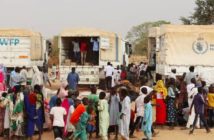Three months ago, a ferocious conflict erupted, though still going on in Khartoum, Capital of the Sudan, and other regions. War or whatever the description of human suffering in Sudan has long been waged under various banners. The gross price paid by the venerable categories’ civilians, women, children has now been doubled without any foreseeable end—it will not be Sudan’s last war to end all wars it has been fighting against itself for decades. Despite the political interpretations of the ongoing war, it now reached a point of no return in terms of its widening scope and atrocities resulting in gross human violations. In case of Sudan escalating conflict between Sudanese National Army SNA and the paramount-militia Rapid Support Forces RSP, the international community is calling to intervene under any pretext to stop the catastrophically war outcomes. It is not only invited to intervene because of its legal commitments binding by human rights conventions, it is rather an urgent human international conscience response—It believed to be a moral conviction regardless of political or economic gains.
The nature of the Sudan current war -though war has a nature other than insane tragedy- has no restricted limits neither it has a tentative or last goal but all-out war against all based on ideological or ethnical tribal motivations. The war has extended so extensively to engage fighters from all colors and political backgrounds and other villages and cities were shortly considered safe havens for those who felt their homes and properties the center of the country. Mindfully, the scorches of war have been transformed into heinous actions to including ethnic cleansing, genocide, and replacement. Those actions in terms of universals jurisdiction rendered an immediate lasting international intervention whether under the umbrella of the United Nations and its mandate under article VII of the U.N Charter.
Since the war erupted in mid-April the international intervention in Sudan affairs seemed to be reluctant and evasive interwoven with regional interests and a new scenario of remapping the region. For Sudan Government GoS currently represented by the Transitional Sovereignty Council the de facto state official representative led by military junta presided by General Abdel Fattah al-Burhan has recently rejected a regional initiative proposed by the Intergovernmental Authority on Development IGAD to settle the Sudanese dilemma. Moreover, the government has undiplomatically requested to consider the UN representative Mr. Volker Perthes, the Special Representative of the Secretary-General for Sudan, and Head of the United Nations Integrated Transition Assistance Mission in Sudan as persona non grata.
Disapproval of international initiatives doesn’t mitigate the situation on the ground in contrary to that the price is too high resulted in vast number of refugees, internal displaced people IDPs, destruction of infra structures, medical facilities have become out of service and many other untold human violations including rapes and dislocated of personal longings. However, as the governing regime involved as one of the warring factions, the military government hasn’t a feasible military plan to defeat its rivals RPS nor it could have the political capacities to resolve the unintermitted conflict and its arcane agenda. Geographically, Sudan war ramifications have affected the neighboring countries which in turn means by UN security level a regional and international threat to the international peace, in terms of UN definition Sudan has now a failed state would become a source of unexpected conflicts.
The unwillingness or say the vacillation of the international community to intervene humanely as the disastrous situation may require would put the entire country at risk not only the physical state as such, but the human condition. Currently, the debacle is that war has superseded all prospective resolutions options internally, no roadmap to be guided the blinded-war lords to just aimed at a peace process. For instance, what’s urgently needed by Sudan’s people is humanitarian interventions, not only international legal debates confined in theoretical conventions. Any procrastination from the international bodies i.e., United Nations and its humanitarian and security structure complicate the Sudan opportunities in stability. Human intervention should assert the integrated part collective human endeavors to facilitate a safe access to humanitarian aid as a priority must be borne by all countries by the international coalition at large.
Obviously, Sudan’s ongoing situation is far applicable to international humanitarians’ intervention like other countries in the manner of restoring peace and protecting civilians. No matter what’s the appropriate formula or law to be imposed by any international body, international institutions, countries both regional and internationally.




